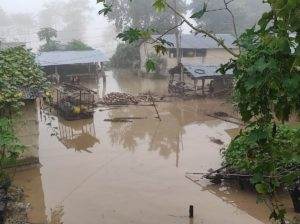Pioneering insurance for flood-risk farmers
Practical Action has launched a pilot project to test an innovative new approach to insuring farmers in Nepal against climate disaster
For farmers in Nepal, the monsoon season is a time of great worry. The high risk of flooding means their crops could be washed away overnight. Losing their crops means they also lose the money they invested in those crops to begin with, driving them deeper into poverty. It’s a cycle that can prove impossible to break free from.
Taking out an insurance policy is a way to reduce the risk and provide certainty, but traditional insurance policies are simply not an option for farmers living in poor, rural communities where the flood risk is so high. Practical Action is working with the Zurich Climate Resilience Alliance and InsuResilience Solutions Fund to develop a new type of insurance for communities in the most flood-prone areas of South-West Nepal.
Traditional insurance is based on an individual evaluation of the losses suffered, which requires a lengthy and complicated assessment process. But this ‘index-based insurance’ is automatically triggered when a flood exceeds a certain threshold. The level of compensation is also pre-agreed, based on the average price for local crops.
This streamlined process is quicker, simpler and cheaper for the insurer to administer. And it means that farmers receive their compensation quickly.
We’ve been laying the groundwork for this pilot for over a year, bringing the partners, community and local government together. Within three weeks of the pilot launch, more than 900 smallholders had bought the new policy to protect their rice fields. One of them is Asharam Tharu, who insured 1.4 hectares of his land. He said, “If the pay-outs are successful as and when the agreed triggers are met, I plan to purchase the same policy to insure more of my land next year.”
Following floods in Nepal in September, the first payments have already been made, arriving within 20 days. Once the monsoon season has finished, we’ll review the success of the project. The learnings we gain will help us develop a scheme that can be offered much more widely, for farmers facing natural disasters across Nepal, and the wider world.
Discover more of our work with the Zurich Climate Resilience Alliance
